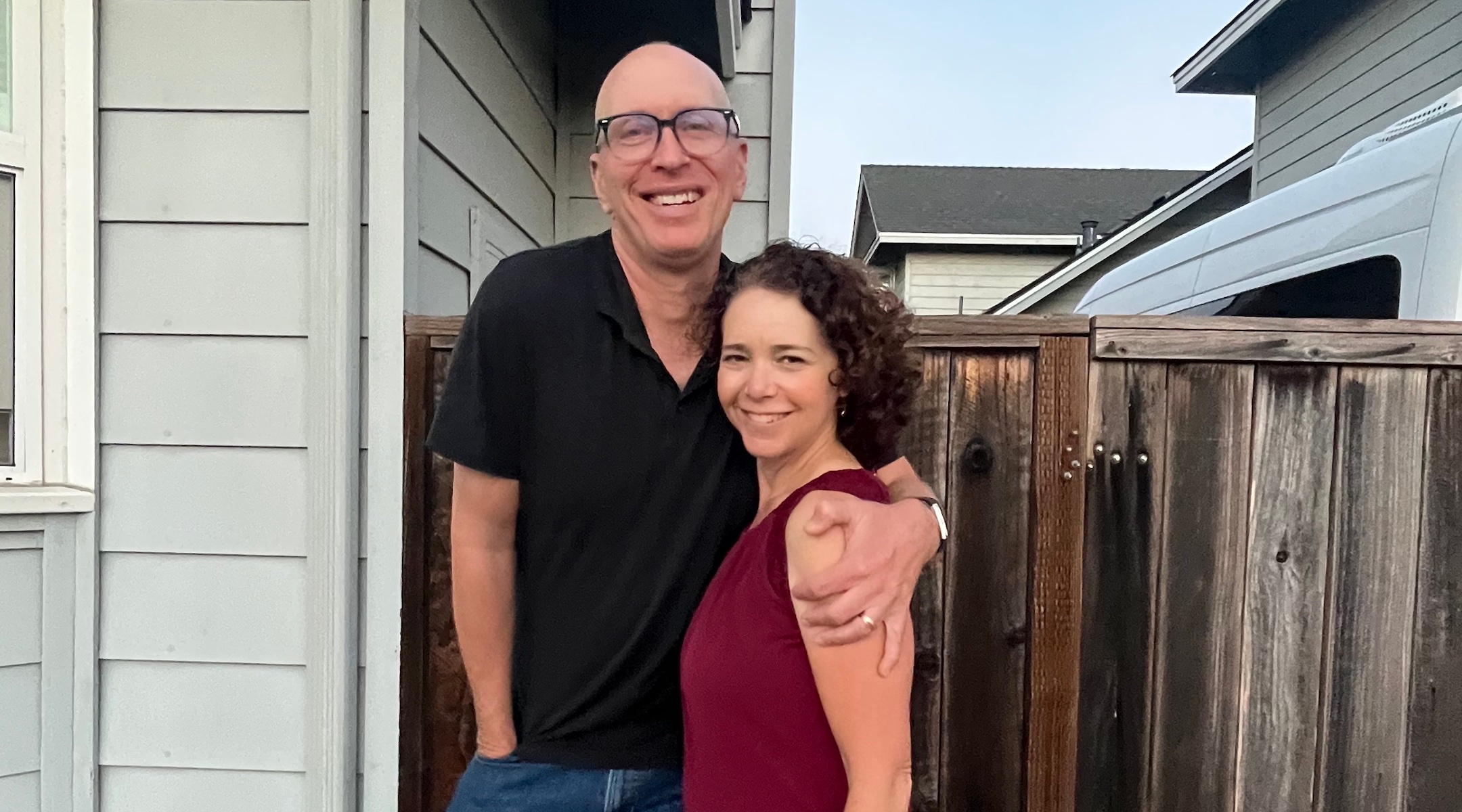Amy Ettinger, who inspired readers with her life-affirming essays on dying, succumbs to cancer at 49
The Kveller contributor wrote that she planned to spend her last months “surrounded by the beauty of nature and my family and friends”

Amy Ettinger, shown with her husband Dan White, wrote about ice cream, mah-jongg and her mother’s kugel recipe. (Courtesy Dan White, via X)
(JTA) — Amy Ettinger, an author and creative writing instructor who chronicled the last months of her life in articles for the Washington Post, died March 20 from cancer at her home in Santa Cruz, California. She was 49.
Ettinger’s essays focused on the things she was able to do and cherish despite her diagnosis with a rare, incurable cancer called leiomyosarcoma: seeing a live performance of “Mamma Mia!” with her 14-year-old daughter, Julianna; eating her favorite pastry from a San Francisco bakery.
“I’ve learned that life is all about a series of moments, and I plan to spend as much remaining time as I can savoring each one, surrounded by the beauty of nature and my family and friends,”she wrote.
Ettinger was an occasional contributor to Kveller, the Jewish family website that is a Jewish Telegraphic Agency partner. There she wrote about her mother’s kugel recipe (“light brown on its crispy top, and the color of milky coffee in the middle”), and how she, as a “non-observant Jew,” marked Yom Kippur — which in 2013 happened to fall on her 10th wedding anniversary.
“Like Yom Kippur, a wedding anniversary is a time to take a step back from your daily life — to weigh the good and bad, to contemplate your triumphs and missteps, to make a vow to do better individually and as a couple,” she wrote.
Ettinger was born in Rochester, New York, and grew up in Cupertino, California. She discovered her calling as a journalist in high school. She majored in American literature at UC Santa Cruz and earned a master’s degree in journalism from Northwestern University in 1999.
Her writing appeared in the New York Times, the Washington Post, New York Magazine, Salon, CNN and Newsweek. In a 2021 article for AARP, she wrote how her mother’s death inspired her to learn Sheila Ettinger’s favorite game: mahjong. She taught writing classes at Stanford Continuing Studies.
In 2017, Penguin Random House published her memoir-cum-travelogue “Sweet Spot: An Ice Cream Binge Across America.” In it she wrote how she keeps “between fifteen and thirty dollars’ worth of ice cream in my freezer at all times” — not to eat, but as an “emergency backup system” in case one of her favorite shops or stores runs out.
Her follow-up story to her Washington Post article, titled “I Have Little Time Left. I Hope My Goodbye Inspires You,” appeared on the newspaper’s homepage less than two weeks before she died.
“I am choosing to focus my limited time and energy on doing the things I love with the people I care most about. It’s a formula that works, I think, no matter where you are in your life,” she wrote.
In an article written after she died, her husband, the writer Dan White, wrote that she had dictated her last essay to him from a reading room at UC Santa Cruz with a view of a redwood forest. He said she had gotten hundreds of personal responses: A handful “unwelcome, including missives from ultrareligious people wanting my proudly Jewish wife to get saved to spare herself from hellfire,” but the vast majority said Ettinger had said inspired them to make the most of their lives, however long they are dealt.
“Amy had no way of predicting that the lines she composed on the spot would be calls to action for readers from all over the United States, as well as Canada, Poland, France and Greece,” White wrote.
This article originally appeared on JTA.org.
A message from our CEO & publisher Rachel Fishman Feddersen
I hope you appreciated this article. Before you go, I’d like to ask you to please support the Forward’s award-winning, nonprofit journalism during this critical time.
At a time when other newsrooms are closing or cutting back, the Forward has removed its paywall and invested additional resources to report on the ground from Israel and around the U.S. on the impact of the war, rising antisemitism and polarized discourse.
Readers like you make it all possible. Support our work by becoming a Forward Member and connect with our journalism and your community.
— Rachel Fishman Feddersen, Publisher and CEO